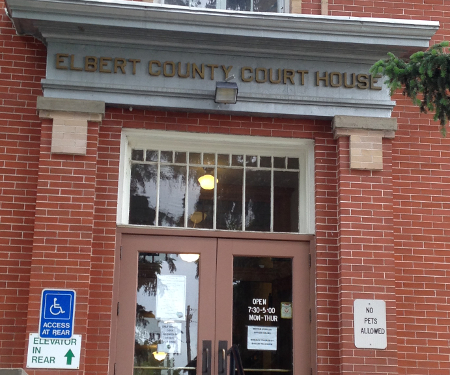By Jeffrey A. Roberts
CFOIC Executive Director
A Kiowa resident alleges in a lawsuit filed this week that the Elbert County Commission violated Colorado’s Open Meetings Law last spring when it considered resolutions to indemnify commissioners in legal cases involving two of them and a former commissioner.
Richard Brown, a retired lawyer who serves on the county planning board, submitted the complaint pro se Wednesday in Elbert County District Court.
The allegations are related to two separate legal cases, including one against commission Chairman Robert Rowland, who was fined $1,000 in 2014 for promoting a county ballot measure in violation of the state Fair Campaign Practices Act. The other involves a federal lawsuit filed by a former county employee who claims she was unlawfully fired.
On April 8, 2015, the county commission approved resolutions to protect Rowland, Commissioner Larry Ross and former Commissioner Kurt Schlegel from personal liability in the cases.
Brown’s lawsuit claims the agenda for that meeting was “deceptive” and failed to provide the public with advance notice that the resolutions would be considered. Brown left the meeting during a recess but would have stayed to voice opposition to the indemnification issues had he known they were coming up for a vote, the suit says.
 “Other members of the public, as well as reporters for local media, also left at the recess,” according to the suit. “Had the true agenda been revealed,” they would have stayed, the suit alleges.
“Other members of the public, as well as reporters for local media, also left at the recess,” according to the suit. “Had the true agenda been revealed,” they would have stayed, the suit alleges.
The state Open Meetings Law, aka the Sunshine Law, says that a meeting notice should be “full and timely” and include “specific agenda information where possible.” While the statute doesn’t specify what “full and timely notice” means, the Colorado Supreme Court in The Town of Marble v. Darien (2008) said “a notice is sufficient as long as the items actually considered at the meeting are reasonably related to the subject matter indicated by the notice…” The Court also said that, in determining whether a notice is “full,” it should be interpreted “in light of the knowledge of an ordinary member of the community to whom it is directed.”
The April 8 agenda merely references “new business” to be considered after an executive session “and makes no effort to describe the nature of the new business,” the lawsuit says. The resolutions should have been on the agenda at least 24 hours prior to the meeting, Brown asserted, because they were prepared prior to the executive session and the commissioners knew they would come up for discussion.
His lawsuit also alleges that commissioners violated the Open Meetings Law by going into an executive session on April 8 without adequately specifying the topics to be discussed behind closed doors and by adopting a position on the indemnification resolutions in that closed meeting.
The lawsuit says the resolutions should be voided because of Sunshine Law violations and because they were approved by only one of the three commissioners. The other two recused themselves.
Rowland told the Colorado Freedom of Information Coalition on Thursday he hadn’t heard about Brown’s legal action and, therefore, couldn’t comment on it. County Attorney Wade Gateley could not be reached for comment.
Meanwhile, the payment of the $1,000 fine assessed against Rowland is a subject of controversy. The Colorado Independent reported last month that Jill Duvall, who made the original campaign finance complaint against Rowland, is seeking sanctions against the commission because Rowland had been ordered to pay the fine personally and instead was reimbursed.
Follow the Colorado Freedom of Information Coalition on Twitter @CoFOIC. Like CFOIC’s Facebook page. Do you appreciate the information and resources provided by CFOIC? Please consider making a tax-deductible donation.




